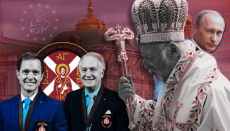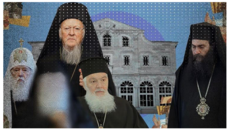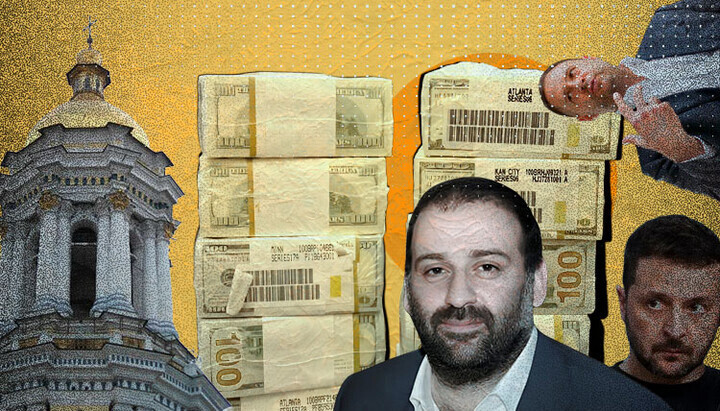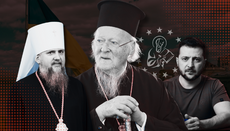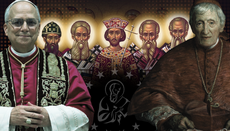Meet the New Rome, Same as the Old Rome
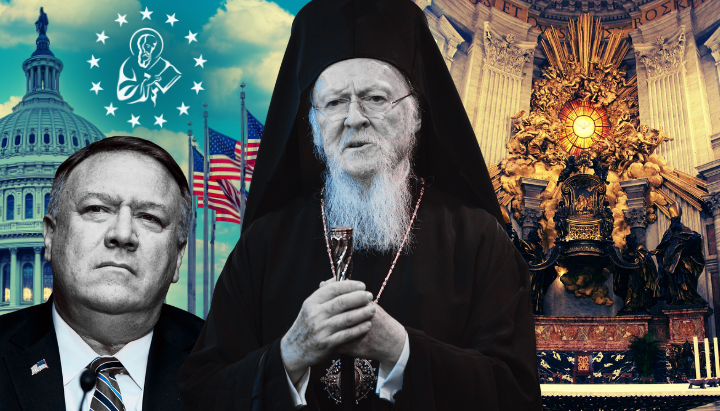
J.D. Vance’s comparison of the Ecumenical Patriarch to the Pope highlights growing tensions within Orthodoxy, as critics accuse Patriarch Bartholomew of pursuing "Greek papism" and aligning with U.S. geopolitical interests, risking the erosion of his primacy of love and the unity of the Orthodox Church.
Last month, when introducing Pat. Bartholomew I to Donald Trump, J.D. Vance reportedly said that “the Ecumenical Patriarch is to the Orthodox Church what the Pope is to the Catholic Church.”
Vance’s analogy underscores a deep and growing fissure within the Orthodox Church: the perception that Constantinople's ancient primacy is morphing into something uncomfortably akin to Roman Catholic papal supremacy. Critics label this "Greek papism," arguing that the Ecumenical Patriarchate (EP) is no longer satisfied with a primacy of honor and love, but seeks administrative control over the autocephalous churches that make up the Orthodox communion.
At the heart of this debate lies Canon 28 of the Council of Chalcedon, promulgated in A.D. 451. It reads:
For the Fathers rightly granted privileges to the throne of old Rome, because it was the royal city. And the One Hundred and Fifty most religious Bishops, actuated by the same consideration, gave equal privileges to the most holy throne of New Rome, justly judging that the city which is honored with the Sovereignty and the Senate, and enjoys equal privileges with the old imperial Rome, should in ecclesiastical matters also be magnified as she is, and rank next after her.
This canon not only elevates Constantinople to "New Rome" status but anchors Orthodox ecclesiology itself. For centuries, it has been wielded in debates with Roman Catholics, who assert the pope's primacy as a divine right, instituted by Christ. Orthodox counter that Rome's privileges stemmed from its imperial stature. Her primacy is a matter of ecclesial right. It is contingent on worldly circumstance, not some eternal mandate.
The implications of this distinction are profound. When the Great Schism severed East from West in 1054, Orthodox theology held that Rome's primacy transferred to Constantinople. Saint Paul's Epistle to the Romans offers a stark warning here:
If some of the branches have been broken off, and you, though a wild olive shoot, have been grafted in among the others and now share in the nourishing root of the olive tree, do not consider yourself to be superior to those other branches... They were broken off because of unbelief, and you stand by faith. Do not be arrogant, but tremble. For if God did not spare the natural branches, he will not spare you either.
Primacy, then, is not immutable. If Rome could forfeit it through schism and heresy, so might Constantinople through hubris or misalignment.
Compounding these theological tensions is the EP's perceived entanglement with American power, a relationship that dates back decades and now threatens to erode its spiritual authority. Patriarch Athenagoras, Bartholomew's predecessor, epitomized this dynamic. In 1942, as archbishop of America, he wrote to a US intelligence agent:
I have three Bishops, three hundred priests, and a large and far-flung organization. Every one under my order is under yours. You may command them for any service you require. There will be no questions asked and your directions will be executed faithfully.
Athenagoras proudly positioned the patriarchate as an ally in Washington's Cold War efforts, viewing U.S. hegemony as divinely ordained to spread freedom.
This pattern persists. More recently, Vance himself accused Bartholomew of accepting U.S. State Department funds in exchange for granting autocephaly to Ukraine's schismatic Orthodox Church (OCU) in 2019, a move that fractured Orthodox unity.
Earlier this month, a wiretapped conversation revealed former Greek defense minister Panos Kammenos assuring a Cretan mafia figure that the appointment of a bishop in Crete hinged solely on American approval. Such incidents paint the EP not as a spiritual shepherd but as a geopolitical pawn, beholden to Washington's whims.
Tragically, His Holiness's recent visit to the United States underscored the EP's new role as a political actor, an agent of American foreign policy.
No one proposes stripping the EP of its primacy. Yet Bartholomew must recognize that his authority is not that of a divine-right monarchy but rather a “primacy of love” (as St. Ignatius called it). That primacy is based on his fellow bishop’s consent and rooted in the reverence for the Holy See of Constantinople.
By offering themselves as errand-boys for the U.S. State Department the Ecumenical Patriarchs risk squandering that goodwill and may force their fellow bishops to withdraw their consent.
The Ukraine fiasco exemplifies this. Granting autocephaly to the OCU has sparked widespread condemnation—and not just from Moscow and its allies, as EP defenders claim. Greek bishops and politicians have voiced outrage over the persecution of Ukraine's canonical Orthodox Church (UOC), including monastery seizures and the revocation of citizenship for its primate, Met. Onuphry. One Greek archbishop lamented anonymously: "We all know that Onuphry is being wronged... However, geostrategic balances do not allow us to say it openly."
Even the late Metropolitan Kallistos Ware, a moderate and erudite voice hardly prone to reactionism, criticized Bartholomew's intervention in Ukraine as a grave error, urging a pan-Orthodox resolution and expressing alarm at the violence against the canonical church. His stance underscores that the backlash transcends Russo-Ukrainian rivalries. It strikes at Orthodoxy's collegial ethos.
In essence, Bartholomew's strategy—abusing what little authority he already has, and hopes that, by doing so, he can convince his brother bishops to cede him more—is pure folly. By acting as Washington's intermediary, he alienates the very bishops whose consent sustains his primacy.
If the EP wishes to preserve even its symbolic role, it must disentangle from U.S. geopolitics and address its missteps in Ukraine. Orthodoxy thrives on conciliarity, not coercion. The EP will ignore Paul's warning—and Rome’s example—at its own peril: even the most venerable branches can be pruned.
